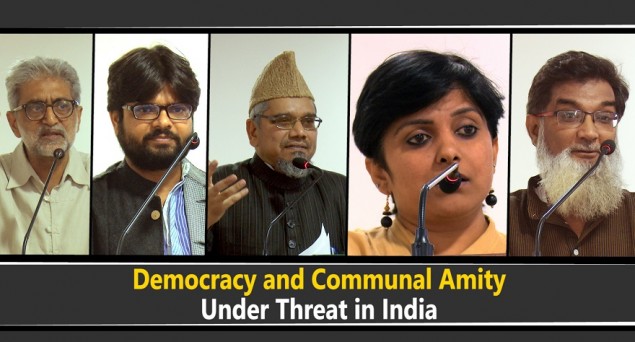Ghazanfar Abbas, IndiaTomorrow.net,
New Delhi, Nov 01: Senior journalists from the mainstream media and intellectuals have expressed deep concern over incidents of intolerance and shrinking space of dissent in the country.
“Democracy does not mean majoritarianism. It means that last person of the society should have the right to live, eat, celebrate any festival, speak any language, marry according to his choice, do a job anywhere and purchase a house anywhere. If he is deprived of his rights or his rights are limited then democracy is in danger,” said Manisha Bhalla, a journalist with Outlook magazine.
She was speaking at a symposium on “Democracy and Communal Amity Under Threat in India” organized here last week.
Speaking on the topic, veteran journalist and Senior Deputy Editor, Frontline magazine, Ziya Us Salam said: “It is the time when the plural ethos of the country are not just being challenged but negated. It is the country which has had Ganga- Jamuni (plural) culture since the beginning.”
Commenting on Hindu fringe elements who try to portray themselves as more patriot than others, he said: “Ask those who give slogan of patriotism, question your nationalism and ask you to say Hindustan Zindabad, what they did with tricolor after 1947. They trampled down the tricolor. And Sardar Patel banned RSS at that time.”
“If today we keep aside RSS from politics, I am not saying from society, this is a peaceful country. Akbar, Aurangzeb, Ashoka and Chandragupta Maurya all were emperor here and this remained a single country,” said Salam.
Senior journalist Krishna Kant from Network18 said success of RSS is failure of secular forces.
“RSS has not emerged all of a sudden. It is the people of this country who kept RSS at bay for 90 years. Community party was formed in the same year when RSS was formed (1925) and it has since formed government in several states. Some other parties also emerged in this period and came to power. The emergence of RSS or fringe elements is not just their success but also failure of the whole secular society,” he said.
In his presidential remark, Mohammad Salim Engineer, Secretary General, Jamaat-e-Islami Hind expressed concern on the shrink space of dissent.
“There is threat to the democratic values embedded in the constitution. Democracy was under threat earlier too but the space for putting different opinions is shrinking speedily since NDA government was formed in May 2014. This is very dangerous for dissent voices,” he said.
“The mentality which killed Mahatma Gandhi is being made respectable and now this mentality has grabbed power too. Those who agree with their opinion are nationalist and who don’t are anti-national. Secondly, a large section of media has been enslaved and this is weakening our country,” said Jamaat leader.
Eminent Journalist and Civil Liberties Activist Gautam Navlakha stressed that people should work for democracy, rather than just complaining and talking about threats to democracy.
“If we have to save the democracy we need to understand our duty. Democracy does not just mean that what other is doing; it means what we are doing. We should also pay attention towards social matters,” said Navlakha.
“Democracy means when things are going in wrong direction, then we should not keep silent. If we remain silent then we give opportunity to those who want to take things into wrong direction.”
“I believe that the present time is very good as it is a challenge to us. Now, either Democracy will survive or fascism will be there in India,” said Navlakha.
Earlier in his opening remarks as moderator of the event, civil rights activist and media professional Wasiq Nadim said that apparently things look going good but actually it is not the case.
“Theoretically things are going fine. Recently elections were held in Delhi and then in Bihar. Now preparations are on for elections in UP. When elections are being conducted and people of different religions are living in the country, it means democracy is safe and apparently it is not facing any threat. But when we look at things deeply, we find that democracy does not mean only electoral process. Rather, democracy is formed with institutions and if institutions start losing their relevance and existence then there is a threat to democracy and democracy is not safe,” said Nadim.





